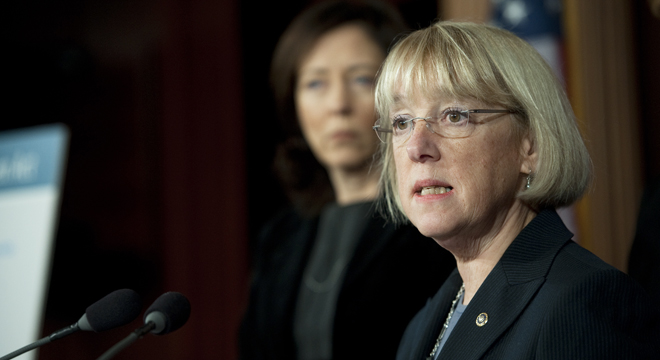Senate Budget Committee Chairman Patty Murray (D-WA) has identified a huge dilemma facing House Republicans and is preparing Democrats to isolate them no matter which horn of it they choose.
It stems from a promise GOP leaders made to angry rank-and-file members earlier this year, when they relinquished the fight over increasing the debt limit. House Republicans, they pledged, would advance a budget that reaches balance within 10 years, without violating any deeply held Republican principles.
That makes for a fine sound bite, but executing such a promise will be painful. Previous GOP budgets have been politically damaging to the party as a whole, and they didn’t zero out deficits for decades. Now, if they intend keep their prior commitments to not increasing taxes, increasing defense funding, and leaving retirement programs untouched for everybody over the age of 55, they’ll have to squeeze incredibly economically and politically damaging cuts into a much shorter time frame.
Alternatively, they can fudge the numbers and claim to have done the impossible.
In a memo to Senate Democrats, obtained by TPM, Murray homes in on this very conundrum.
“We don’t yet know the details of House Republicans’ updated budget plan, but assuming they keep their promises, we have a good idea about what to expect,” Murray writes. “Because they have boxed off so much of the federal budget, House Republicans will have to resort to gimmicks or make deep, extreme cuts to programs that impact families, seniors and our long-term economic strength.”
Murray dives into the numbers, and explains that Republicans will have to make enormous cuts to either non-defense discretionary spending, Medicaid and other programs for the poor, or both. The details are ugly, even accounting for the fact that tax revenues just went up in the fiscal cliff deal and spending is about to be cut via sequestration.
Here’s the rundown:
Assuming no new revenue, the total spending cuts necessary to reach this target average close to 10 percent of projected spending over the next ten years. If no fundamental changes to Medicare and Social Security are included in the first ten years as promised, the remaining pieces of the budget would have to take a 17 percent across-the-board cut. Excluding defense, as House Republicans have done in the past, the across-the-board cut for remaining programs would climb to more than 23 percent. Those numbers represent averages over the decade, but since they would have to be phased in, the cut in the last year is much deeper – 36 percent for all programs excluding Medicare, Social Security and defense. These cuts would require changing the structure of crucial safety net programs or cutting annual non-defense discretionary spending–which includes everything from education to road repairs to medical research–so deeply that many important investments would be eliminated completely. The Congressional Budget Office projects non-defense discretionary spending will total approximately $6 trillion between 2014 and 2023; the $4 trillion in deficit reduction necessary to reach balance represents about two-thirds of this total. Protecting programs such as Medicaid, SNAP and other mandatory spending in the budget, therefore, would require massive cuts to non-defense discretionary programs.
There’s a catch, though. Republicans could assume unrealistic levels of economic growth — or otherwise fudge the numbers — to help them hide the magnitude of the cuts. And then they’ll boast of having introduced a balanced budget while Senate Democrats have not. Murray wants to undercut that contrast, and instead juxtapose the priorities the Democratic budget will enshrine with the ones Republicans insist on undermining.
“To conceal the severe impact their policies would have, House Republicans could simply assume them away,” Murray writes. “Given where House Republicans seem to be headed with their budget, we can expect another extreme ideological approach. … And that is why, as we develop our budget resolution and hope to come to a bipartisan budget agreement, it is so important that we stay focused on what will work.”
Read the entire memo below.






